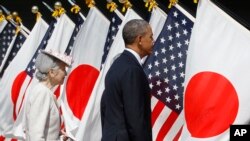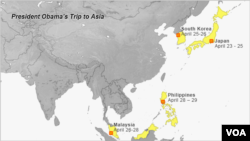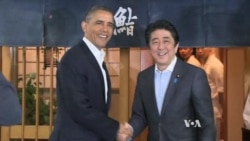TOKYO —
President Barack Obama has reassured Japan that the U.S. will abide by its commitment to help defend the country if China seizes a disputed group of islands, but made clear that he is not setting a red line that would result in the U.S. attacking Chinese forces.
Obama came to Japan offering reassurances that the Japanese leadership has been wanting to hear. Tensions remain high over the islands in the East China Sea that Japan administers but China claims.
At a briefing with Japan's Prime Minister, Shinzo Abe, the U.S. leader said the United States intends to uphold a decades-old mutual defense treaty in the case of the islands - known in Japan as the Senkaku and in China as the Diaoyu.
“Obviously this isn't a red line that I'm drawing. It is the standard interpretation over multiple administrations of the terms of the alliance, which is that territories under the administration of Japan are covered under the treaty. There's no shift in position. There's no red line that's been drawn. We're simply applying the treaty,” said Obama.
China's stance
Responding to Obama's remarks, Chinese foreign ministry spokesman Qin Gang said nothing will change "the basic reality that the Diaoyu Islands are China's inherent territory." He said Beijing remains determined to protect its "sovereignty and maritime rights."
Obama’s visit comes at a time when confidence is shaky among many Japanese who see the United States' failure to make good on its threats to attack Syria and its reluctance to provide lethal aid to Ukraine as signs that the U.S. may not come to Japan's aid against China.
The president is starting a weeklong tour of Asia meant to show U.S. allies that the administration's promised pivot of its diplomatic efforts and military forces to Asia remains on track. He will also visit South Korea, Malaysia, and the Philippines.
In his conversations with Prime Minister Abe, Obama encouraged Japan to speed up negotiations for the Trans-Pacific Partnership, a multinational pact that would create one of the world's largest free trade zones. The deal is held up by a dispute over Japanese agricultural tariffs.
Ukraine
On Ukraine, the U.S. leader said he is getting ready to impose new sanctions on Russia for not following through on the commitments it made in Geneva last week to deescalate the crisis.
“We have been preparing for the prospect that we're going to have to engage in further sanctions. Those are teed up [ready]. It requires technical work and it also requires coordination with other countries,” said Obama.
The president heads to South Korea next. Tensions there have been heightened by indications that North Korea may be planning another nuclear test.
WATCH: Related video report by Luis Ramirez
Obama came to Japan offering reassurances that the Japanese leadership has been wanting to hear. Tensions remain high over the islands in the East China Sea that Japan administers but China claims.
At a briefing with Japan's Prime Minister, Shinzo Abe, the U.S. leader said the United States intends to uphold a decades-old mutual defense treaty in the case of the islands - known in Japan as the Senkaku and in China as the Diaoyu.
“Obviously this isn't a red line that I'm drawing. It is the standard interpretation over multiple administrations of the terms of the alliance, which is that territories under the administration of Japan are covered under the treaty. There's no shift in position. There's no red line that's been drawn. We're simply applying the treaty,” said Obama.
China's stance
Responding to Obama's remarks, Chinese foreign ministry spokesman Qin Gang said nothing will change "the basic reality that the Diaoyu Islands are China's inherent territory." He said Beijing remains determined to protect its "sovereignty and maritime rights."
Obama’s visit comes at a time when confidence is shaky among many Japanese who see the United States' failure to make good on its threats to attack Syria and its reluctance to provide lethal aid to Ukraine as signs that the U.S. may not come to Japan's aid against China.
The president is starting a weeklong tour of Asia meant to show U.S. allies that the administration's promised pivot of its diplomatic efforts and military forces to Asia remains on track. He will also visit South Korea, Malaysia, and the Philippines.
In his conversations with Prime Minister Abe, Obama encouraged Japan to speed up negotiations for the Trans-Pacific Partnership, a multinational pact that would create one of the world's largest free trade zones. The deal is held up by a dispute over Japanese agricultural tariffs.
Ukraine
On Ukraine, the U.S. leader said he is getting ready to impose new sanctions on Russia for not following through on the commitments it made in Geneva last week to deescalate the crisis.
“We have been preparing for the prospect that we're going to have to engage in further sanctions. Those are teed up [ready]. It requires technical work and it also requires coordination with other countries,” said Obama.
The president heads to South Korea next. Tensions there have been heightened by indications that North Korea may be planning another nuclear test.
WATCH: Related video report by Luis Ramirez








